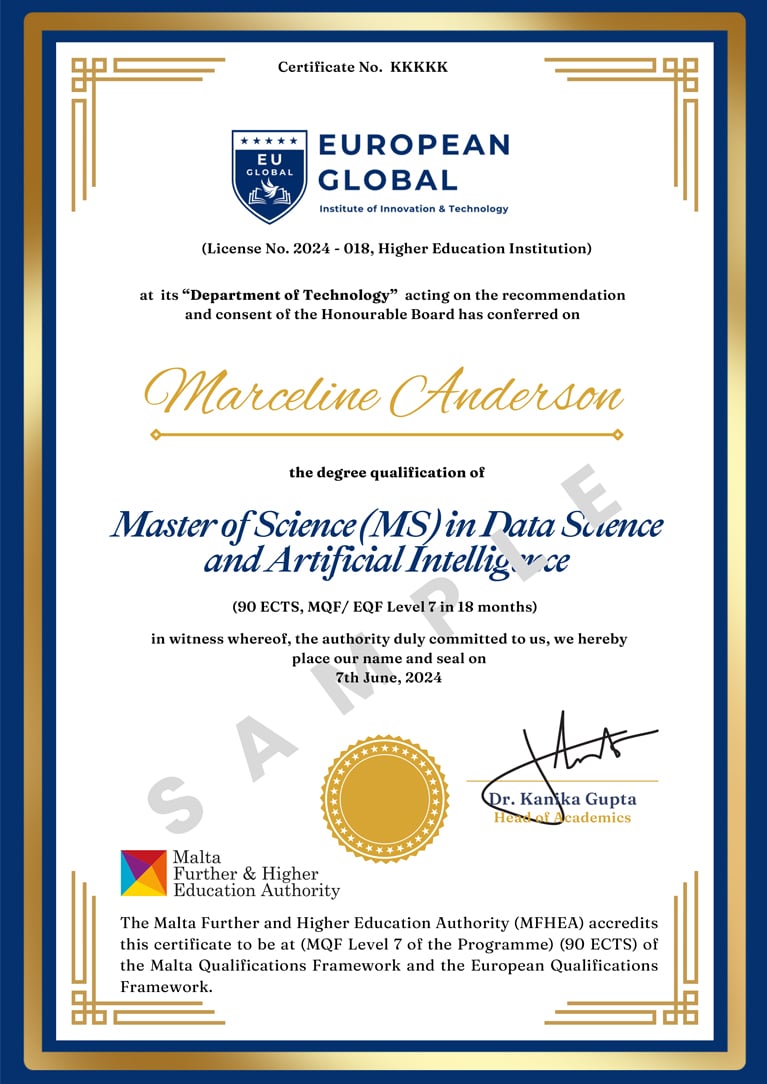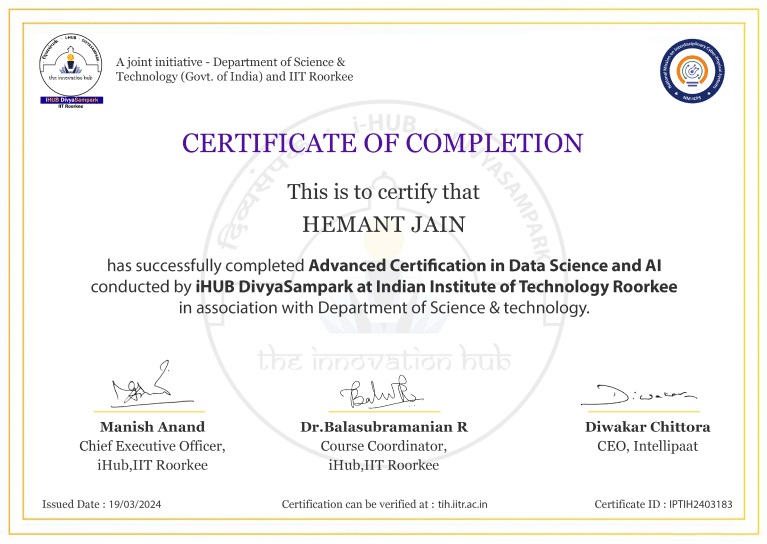Your cart is currently empty.






The Master of Science (MS) in Data Science and AI from The European Global Institute of Innovation & Technology (EU Global) is an innovative online degree program tailored for professionals who want to excel in Machine Learning & AI domain.. This prestigious program equips students with the skills needed to thrive in influential AI roles across various industries, preparing them for leadership opportunities in the rapidly changing tech environment.

Watch
Course PreviewLearning Format
Online
Program Duration
12-18 Months
Career Services
by Intellipaat
MS
by EU Global
EMI Starts
at ₹8,000/month*
The MS in Data Science and AI program brings the research focus along with mastering Industry ready AI skills looked by top MNC’s. This program provides comprehensive understanding of Data Science, Machine Learning, AI, GenAI and Agentic AI.
About EU Global
The EU Global Institute of Innovation & Technology (EU Global) stands as an institution devoted to education in areas of data science, AI, and other emerging technologies. With a strong emphasis on academic excellence and innovation, EU Global equips professionals to thrive in the rapidly changing AI landscape.
Key Features
About iHUB DivyaSampark, IIT Roorkee
iHUB DivyaSampark aims to enable innovative ecosystem in new age technologies like AI, ML, Drones, Robots, data analytics (often called CPS technologies) and becoming the source for the next generation of digital technologies, products and services by promoting, enhancing core competencies, capacity building, manpower training to provide solutions for national strategic sectors andRead More..
Key Achievements of IIT Roorkee:
You will get to work in one of the strongest economies in the world, with the fourth highest GDP and 94% employment rate.
You will gain exposure to the German corporate world and global network.
Europe is a land of job opportunities with an employment rate of 94%
There is a high chance to get Permanent Residence (PR) in Europe.
Europe has an affordable cost of living.
The average salary in Europe after completion of the course is ₹45,00,000 p.a.
Skills to Master
Machine Learning
Deep Learning
Big Data Analytics
Programming in Python and R
Cloud Computing for AI
Data Visualization
Reinforcement Learning
MLOps & Model Deployment
Generative AI
The module focuses on developing statistical thinking to set a solid foundation for rest of the modules. It involves introduction to the statistical concepts and tools widely used for Data Analysis and helps in effective decision making. You will be working upon multiple case studies, exercises to develop critical thinking and data analytical approach.
Mathematics for Data Science builds essential math skills for data analysis, statistics, and machine learning. It combines theory and practical applications to help students confidently tackle real-world data problems and kickstart their journey into machine learning and AI.
Python for Data Analytics equips students with a strong foundation in Python programming, starting from basic scripting to advanced data science libraries. Students will explore powerful Python libraries to solve real-world problems in data analysis and visualization.
Data Storytelling teaches students how to turn data into compelling narratives. They will learn to source, analyze, and visualize datasets, uncover meaningful insights, and communicate findings effectively across visual, written, and oral formats. The module helps students with the tools and skills to present data-driven stories tailored to different audiences.
Machine Learning & AI offers in-depth coverage of core concepts in supervised and unsupervised learning, along with popular algorithms and real-world applications. The module balances theory with hands-on practice, enabling students to design intelligent solutions using machine learning and deep learning techniques across diverse domains.
Machine Learning with Python familiarizes students with key algorithms in regression, classification, and clustering. Through real-world datasets, students will build predictive models and data segmentation. They will also learn how to structure machine learning solutions as deployable data products. By module end, students will be able to implement basic ML algorithms in Python and generate actionable insights.
This module is designed to provide an in-depth understanding of Convolutional Neural Networks (CNNs) and Recurrent Neural Networks (RNNs), two fundamental architectures in the field of deep learning. Students will gain hands-on experience in designing, implementing, and optimising these neural network types for various applications, including image recognition, natural language processing, and sequential data analysis.
Master computer vision and image recognition algorithms. Build real world applications by mastering computer vision and pattern or object recognition techniques.
Natural Language Processing offers a comprehensive introduction to modern NLP techniques, focusing on practical tools and workflows using Python. Students will learn to manage and analyze textual data across domains, gaining hands-on experience through individual projects. The course blends theory with practical application, equipping students to perform meaningful linguistic analysis using cutting-edge NLP methods.
The broad rise of large information stockpiling needs has driven the birth of databases generally alluded to as NoSQL information bases. This course will investigate the sources of NoSQL information bases and the qualities that recognize them from customary data set administration frameworks. Central ideas of NoSQL information bases will be introduced.
Data Warehousing & Management equips students with the essential skills to design data warehouses and build data integration workflows using tools like Oracle, MySQL, or PostgreSQL. The module covers key concepts such as architectures, multidimensional models, and organizational practices, blending hands-on design with real-world business intelligence needs.
Research Methodology provides students with essential skills to design, conduct, and present research effectively. Covering both qualitative and quantitative methods, the course teaches how to frame research questions, collect and analyze data, and write research proposals. It emphasizes ethical practices and systematic scientific writing, preparing students for academic and professional research across disciplines
Capstone Consulting Project & Master Thesis is the final milestone for students specializing in Data Science and AI. Through an industry-based consulting project, students apply their knowledge to solve real-world challenges in teams. The course culminates in the submission of a Master Thesis, showcasing their expertise and practical impact.
This program requires submission of Master Thesis.

Admission Details
The application process consists of three simple steps. An offer of admission will be made to selected candidates based on the feedback from the interview panel. The selected candidates will be notified over email and phone, and they can block their seats through the payment of the admission fee.
Submit Application
Tell us a bit about yourself and why you want to join this program
Application Review
An admission panel will shortlist candidates based on their application
Admission
Selected candidates will be notified within 1–2 weeks
Total Admission Fee
EMI Starts at
We partnered with financing companies to provide very competitive finance options at 0% interest rate
Financing Partners
![]()
Admissions close once the required number of students is enrolled for the upcoming cohort. Apply early to secure your seat.
| Date | Time | Batch Type | |
|---|---|---|---|
| Program Induction | 5th July 2025 | 08:00 PM IST | Weekend (Sat-Sun) |
| Regular Classes | 5th July 2025 | 08:00 PM IST | Weekend (Sat-Sun) |
The program does not require prior coding experience, although it can be helpful.
The MS in Data Science and AI spans 12-18 months, designed to provide a balance between coursework, hands-on projects, and thesis work.
The program fee covers tuition and course materials. It does not include travel, accommodation, and other incidental expenses during campus immersion.
Students must complete a research thesis that applies AI and data science concepts to address real-world business or technological challenges.
The program features a combination of live interactive sessions and recorded lectures, providing flexibility for working professionals.
Flexible payment plans are available, including no-cost EMI options, making the program financially accessible for students.
Yes, the program is structured to assist working professionals & fresher’s in transitioning to AI-focused roles by equipping them with in-demand skills and relevant industry experience.
Career services include job placement assistance, resume building, mock interviews, and access to an exclusive job portal.
Yes, the degree from EU Global is accredited and recognized internationally, enabling graduates to pursue career opportunities around the globe.
AI professionals are in high demand in industries such as healthcare, finance, retail, manufacturing, and technology.
Absolutely, students will engage in real-world projects, case studies, and capstone projects in partnership with industry professionals.
Yes, the program is designed with flexibility in mind, making it suitable for working professionals who need to balance their studies with their jobs.
The curriculum includes Python, R, and SQL, which are crucial for applications in AI and data science.
EU Global provides both merit-based and need-based scholarships for eligible students.
Students will have complete access to the EU Global digital library, e-learning platform, and recorded sessions for lifelong learning.
The admission process consists of an online application, submission of necessary documents, and an interview with the admissions team.
Yes, students benefit from personalized career coaching to assist them with job applications, interviews, and strategies for career advancement.
Yes, EU Global has a refund policy that depends on the enrolment timeline and specific conditions.
Yes, the program welcomes students from around the globe, creating a rich and diverse learning environment.
Graduates enjoy lifetime career support, access to alumni networks, and ongoing learning opportunities to keep up with industry developments.
What is included in this course?
 Click to Zoom
Click to Zoom
 Click to Zoom
Click to Zoom




